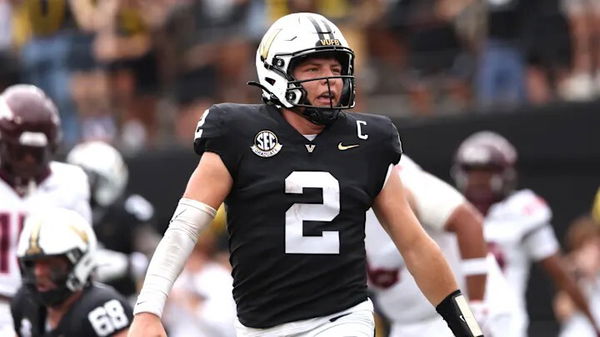

NCAA is making things harder for players on so many levels. Be it a new 12-team playoff format, the odd transfer portal timeline, NIL allurement, or anything that sort, everything looks a lot more complicated than before in the updated CFB structure. However, Diego Pavia didn’t give in to the mess. He fought for it and earned his valid eligibility for one more year with the Commodores. If you think it’s all about personal gains, it’s not. It’s a rare beam of hope that is wide-spreading among the rest of the programs, encouraging youngsters to earn their years. It’s specifically influencing Kansas State given its large numbers of junior-level football setups.
Vanderbilt quarterback Diego Pavia suddenly found himself out of the eligibility clock in his first year with the Vanderbilt. It was as awkward as it sounds. Still, the QB phenom didn’t accept that his rookie years could be taken into consideration for NCAA eligibility. Thankfully, a court heard him outright, handing Pavia a much-needed injunction that may well tie him for another year in the college. Such a breather for the Commodores! But not just for the Commodores. It will help out the Big 12 underdogs, K-State, and their guys as well.
‘‘I would say for now the NCAA should say everyone is granted the exact same ruling that Pavia was. That’s the only way to handle this. There’re players, for example, on the K roster who don’t know if this was their last season or not, and they deserve to know if the NCAA wants to fight that ruling that guidance can be changed later, but this is a really interesting position for Kansas State,” GoPowercat publisher Tim Fitzgerald shared his thought unfiltered.
ADVERTISEMENT
Article continues below this ad
Pavia sued the NCAA in November, claiming its rule on overall eligibility years violates antitrust law. He argued the rule limits his NIL opportunities and stunts his growth as an athlete. Pavia’s lawsuit says his time at Mexico Military Institute, a JUCO he attended in 2020-21, shouldn’t count against his NCAA eligibility. His lawyers argued that the NCAA’s clock should start in 2022, when he joined New Mexico State. Now the implications of Pavia’s injunction can trigger a new era in college football reality. Athletes might push for extended careers, playing two years in JUCO and five in D-1—or even more, leveraging grad programs. Others could challenge NCAA rules for younger players, reshaping eligibility standards entirely.


The #NJCAA and @NJCAA_Exec statement on the court’s decision for Diego Pavia below:#OpportunitiesStartHere pic.twitter.com/uE9yGWDhAT
— NJCAA (@NJCAA) December 19, 2024
“You can’t have like 20 more walk-ons for practice, 105 hard set numbers. I don’t know what that means for the K State walk-on program; in reality, I’m concerned about it but there is now a possibility of Kansas State, which is surrounded by junior colleges in the state of Kansas, really good junior college football programs, can set up situations with certain JUCO’s to send players there and probably even paid to send them there to receive coaching preparation and then be able to bring them back to Kansas State in two years, or just one year,” Fitzgerald added to K-State potential policy going forward.
Kansas-based sports law attorney Mit Winter also believes Diego Pavia’s case would help the K-State athletes and others as well to raise a mass lawsuit against NCAA rule.
Kansas City-based sports law attorney comments on Diego Pavia’s NCAA resentment
ADVERTISEMENT
Article continues below this ad
This lawsuit, focused on Diego Pavia’s individual case, could have major ripple effects. Even sports law attorney Mit Winter believes a victory for Pavia would significantly weaken the NCAA’s ability to count junior college time against other athletes.
“If you think about it,” Winter explained, “any other athlete in Pavia’s situation can now go to a court, file the same exact type of lawsuit and say here’s an order from another court specifically saying this likely violates antitrust law and you enjoined it. … If the NCAA tries to enforce this rule against other athletes, there’s gonna be a tsunami of lawsuits in my opinion.” So, there will be a tricky shadow of law in that area.
On pen and paper, Winter sounds right. All the athletes in Diego’s shoes should avail the opportunity. It also gives some relief to the players with fewer offers and fewer NIL deals at hand to choose to stay in their path. They may continue with JUCO, as they don’t need to worry about their years. Because, no matter what, they can start fresh a four-season tenure with the NCAA at any given time.
But as the debate is in a very early stage now and we are yet to see the final verdict of the case, it won’t be wise to come to any conclusion. But if it goes in Diego’s favor, it significantly increases the likelihood of the future unfolding as mentioned above. It’s straight and clear! Diego wins, everyone wins!
ADVERTISEMENT
Article continues below this ad
Have something to say?
Let the world know your perspective.
ADVERTISEMENT
Debate
Is Diego Pavia's fight against NCAA rules a game-changer for college athletes everywhere?
ADVERTISEMENT
ADVERTISEMENT



What’s your perspective on:
Is Diego Pavia's fight against NCAA rules a game-changer for college athletes everywhere?
Have an interesting take?